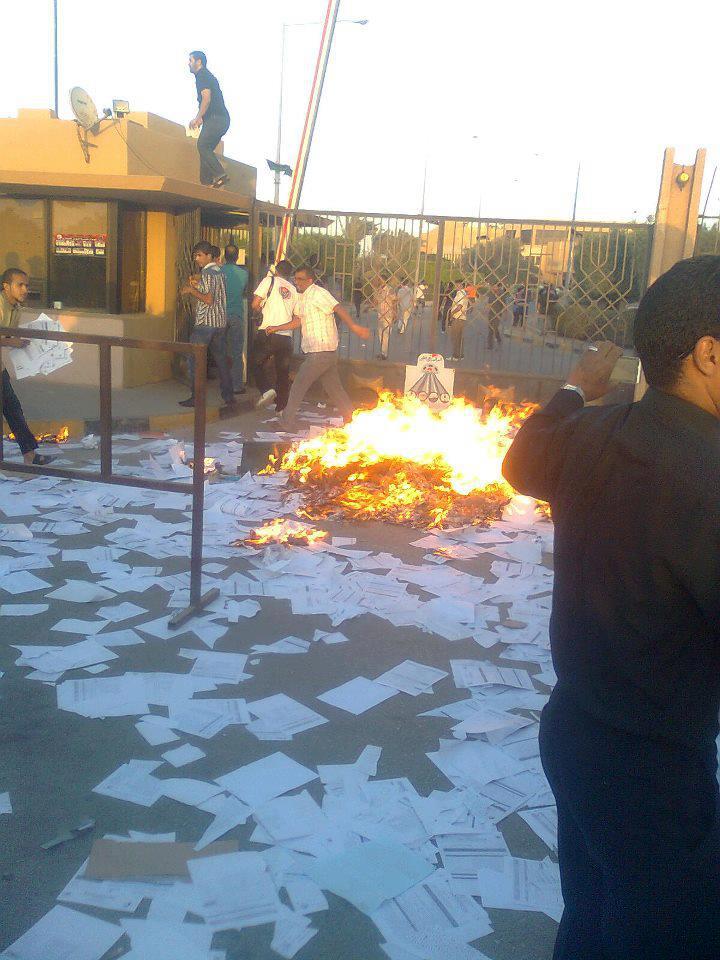By George Grant and Ashraf Abdul Wahab.
Tripoli, 1 July:

Protesters chanting pro-federalist slogans stormed the offices of the HNEC in Benghazi and . . .[restrict]Tobruk earlier today, in the latest demonstration of eastern unrest ahead of the 7 July elections.
A Reuters correspondent witnessed around 300 men raiding the Benghazi office, destroying computers and ballot boxes and burning election materials outside.
A smaller number of protesters are believed to have entered the Tobruk office, beating the deputy chairman of the HNEC in the city, Mufta Othman, although his injuries are not said to be serious.
There are conflicting reports as to whether the protesters were armed or not in both incidents.
Following the raid on the Tobruk office, a crowd of local residents rallied to defend the offices and drove the protesters out.
The attacks appear to have divided opinion in eastern Libya, with one photograph of the Benghazi attack that was posted on the social networking site Facebook receiving more than 200 ‘Likes’ within an hour.
Condemning the incidents, Rashid Maihub, a senior official at the HNEC in Tripoli, said he did not believe the attacks would delay the elections or prevent any citizens from casting their vote on 7 July. “We have everybody’s data stored on computers, including centrally here in Tripoli, so there will not be a problem with information being lost. If voters bring their registration cards with them on polling day, they will still be able to vote”.
Adel Almansouri, a Benghazi resident and headmaster of the International School in Benghazi, described todays events as “worrying” and said he believed Libya should expect more such incidents in the run-up to the elections.
“There are many people trying to destabalise the elections, although I don’t think there is cause for panic just yet. Nevertheless, better security has to be provided to these places and both the NTC and the government need to start taking these issues seriously”.
Almansouri said he hoped the elections would go ahead, arguing that the federalists should make their case constructively inside the National Conference. “Whether I agree or disagree with the federalists’ demands, the vote must go ahead or else Libya will never move forwards.”
With just one week to go until nationwide elections, anger has been growing in eastern Libya over what many perceive as the unjust distribution of seats for the National Conference.
The distribution, which is based on demographics, allocates 60 seats to the east as against 100 to the west, with 40 for the south.
Pro-federalists have demanded an equal distribution of seats between east and west to ensure their concerns are not neglected in the conference, particularly when it comes to drawing up the permanent constitution.
The NTC has argued that it adequately addressed these concerns with the Article 30 Amendment to the 3 August 2011 Constitutional Declaration.
This amendment stipulates that the actual committee tasked with drawing up the constitution will have equal representation from east, west and south, with each providing 20 delegates. The amendment also states that in addition to ratification by a simple majority in a nationwide referendum, ratification will also require a two-thirds plus one majority in the National Conference, meaning the east could still block it if they wished.
Most recently, the interim government has suggested that appointment to the constitution-writing committee could be decided by regional bloc votes within the National Conference to ensure each part of Libya got the representatives on the committee they wanted.
Talk of an election boycott by federalists has been growing in recent days, although it is still not clear how many people in eastern Libya would support such a move. [/restrict]






